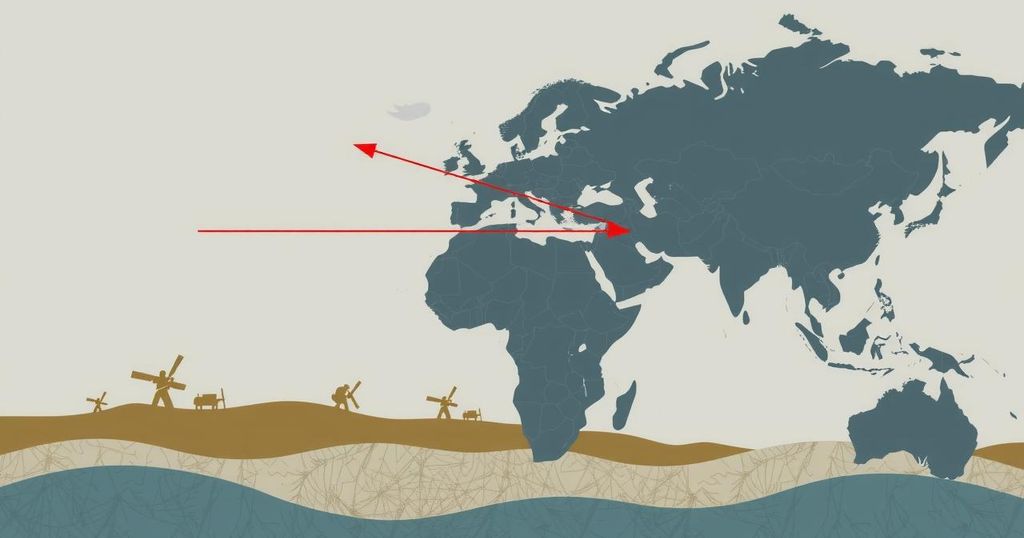President Donald Trump has warned Iran will be held accountable for any Houthi attacks from Yemen, escalating tensions following U.S. military strikes against Houthi targets. Trump claims Iranian support for the Houthis underpins their actions, and has threatened serious consequences for Iran amidst ongoing regional conflict. The military actions and increased rhetoric signal a dramatic shift in Trump’s approach towards Iran and the Houthis, potentially influencing future diplomatic efforts regarding Iran’s nuclear ambitions.
In a recent statement, President Donald Trump has escalated his rhetoric against Iran, warning it will be held accountable for any attacks launched by the Houthi rebels from Yemen. The President’s remarks were made on his social media platform, Truth Social, following a series of U.S. aerial strikes on Houthi positions in Yemen. He emphasized that all Houthi attacks are organized by Iran, demanding that the Iranian government cease its support for the Houthis.
The Houthis have engaged in numerous attacks on ships in the Red Sea, particularly in response to Israel’s actions in Gaza. Experts recognize that Iran provides arms to the Houthis, who are part of an Iranian-backed coalition known as the “axis of resistance.” Trump’s explicit threats indicate a potential shift toward military action against Iran itself amidst escalating tensions in the region.
Trump stated, “Every shot fired by the Houthis will be looked upon, from this point forward, as being a shot fired from the weapons and leadership of IRAN, and IRAN will be held responsible, and suffer the consequences, and those consequences will be dire!” This declaration coincides with heightened military operations in Yemen, presenting a complex diplomatic situation, particularly pertaining to Iran’s nuclear ambitions.
The President previously withdrew the United States from the Joint Comprehensive Plan of Action (JCPOA) aimed at curtailing Iran’s nuclear program. Even as Trump urges negotiations, Iranian leaders have rejected his overtures, viewing his actions as bullying. Iran insists its nuclear initiatives are solely for peaceful purposes and denies any intent to develop nuclear weapons.
On the ground, the Houthis have vowed to escalate attacks against what they perceive as Israeli incursions in response to an Israeli blockade in Gaza. In reaction to these threats, Trump ordered a series of military strikes against Houthi positions which he justified by stating support for Houthi terrorists must end immediately. He emphasized, “Do NOT threaten the American People, their President… or Worldwide shipping lanes.”
The U.S. military’s strikes resulted in significant casualties and destruction across multiple Yemeni provinces. Although previous offensive strategies employed by the Biden administration were positioned as efforts to weaken Houthi military capacity, Trump’s aggressive approach has drawn criticism. He has labeled Biden’s responses as insufficient, criticizing them as “pathetically weak.”
The Houthi leadership has pledged retaliation against U.S. forces, stating they will counter any escalation. Trump’s current military strategy contrasts with his prior campaign promises of reducing U.S. engagement in Middle Eastern conflicts. Colin Clarke from the Soufan Group suggests that Trump’s actions may aim to pressure Iran back to nuclear negotiations through military signals.
In conclusion, President Donald Trump’s recent warnings directed towards Iran represent a significant escalation in U.S. foreign policy regarding the Houthis. His rhetoric and subsequent military actions signal a notable turn from diplomatic negotiations to a more aggressive stance, potentially setting the stage for heightened conflict in the region. The ongoing situation continues to develop, with the risk of broader implications for U.S.-Iran relations and regional stability.
Original Source: www.aljazeera.com




